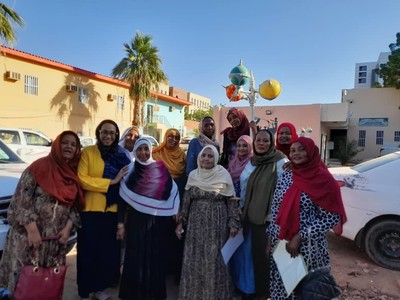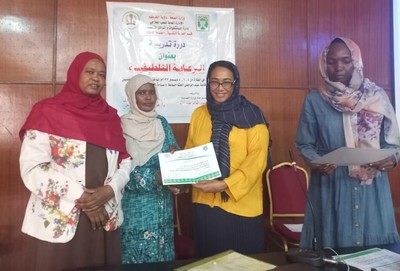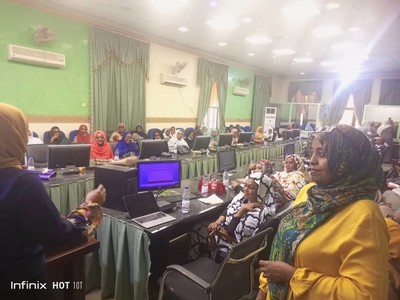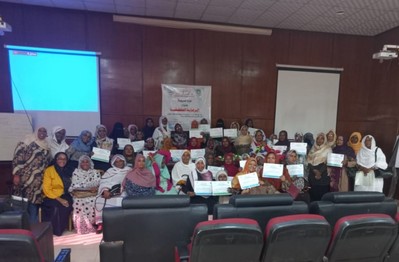
Blog: Bringing Palliative Care to Psychologists and Social Workers in Sudan
![]() Cairdeas
Cairdeas
![]() 10th February 2023
10th February 2023
Blog submitted by Dr Nahla Gafer, a clinical oncologist at the Khartoum Oncology Hospital, Sudan. Dr Gafer has been involved in past regional training in palliative care, such as the Kuwait WHO PC workshop and in Mauritania through Cairdeas Sahara. Today she shares about her recent workshop for psychologists and social workers.
Let me start with the beginning of my palliative care journey: it was 2009, and for the first time, I attended a formal course in palliative care at Hospice Africa Uganda. I was intrigued by the weather, intrigued by the vegetation, and intrigued by the organization. I remember meeting Prof Anne Merriman in a beautiful summer house. And I remember seeing a coloured brochure describing items like a 5 week Initiators course, a 3 day workshop for psychologists, and 9 month programme for nurses. I was thrown out of my feet. How organized they are and how developed they are in palliative care!
Years pass, a palliative care unit is born with staff from Sudan are trained in palliative care. I go abroad to complete my Master’s degree in palliative care, and I advocate for palliative care. In this time, I meet SANAD Lebanese Association for Palliative Care and our team trains in a Hospice@Home programme. SANAD then organizes an online course for 27 health professionals, where several psychologists attend the workshop. The director of training at the Ministry of Health in Sudan contacts me about further training. And so, a three day palliative care workshop for psychologists and social workers is planned for and conducted end of 2022.
I am so glad that I was able to conduct this workshop. In the beginning I thought I could not elaborate much when it comes to items like symptom management as they are not doctors. Yet I discovered that when teaching palliative care, a lot can be explained even to non-health professionals, and especially for the candidates in this workshop, the majority of whom have long experiences in specialised hospitals.
Twenty-five psychologists and twenty-five social workers attended the workshop, representing 23 specialized hospitals as well as the Federal Ministry of Health. My job was easy, I just gave them a new outlook for the problem: the patient is the centre of our care, we are here to help the patient and family until the end by providing explanations, support, symptom management and a listening ear.
It was a wonderful experience for all. As an example, we came up with 50 activities for self-care, and as I mentioned even for symptom management I succeeded in explaining a lot: what symptoms to expect in which diseases, how to assess them, how to think holistically and how to manage those symptoms non pharmacologically. As for the pharmacological management, I asked them what medications we use, without elaborating on the doses, route, or timing.
We delved into family issues, attachment types, complicated grief, suicidal tendencies, distress, anxiety and depression. It was very interactive and very engaging. I was joined by nurse named Wafa Abdalla and a psychologist, Eman Mansour, who both came from our palliative care unit to assist me in the training.
The feedback after each session was great. Candidates mentioned that they learned important concepts like: patient’s dignity, patient’s rights, quality of life, taking into consideration patient's age, understanding and cultural background, the six steps involved in breaking bad news, instilling hope, different types of hope, the importance of explaining the disease to the patient and family, and most importantly that palliative care brings back humanity to the patient (i.e. patient feels he/she has a say in what is happening).
They felt palliative care aligns well with the needs of the patients they meet in their day-to-day work, and a couple of them were eager to contact their administration for training in their hospitals, with a subsequent plan to provide the services. I am open to help, and I am thankful for all my teachers in palliative care.

Dr Nahla Gefer (in yellow, second from the left) poses with candidates who attended the palliative care workshop.

Ms Mai Sabir, State Ministry of Health, Dr Nahla Gafer, Sr. Wafa Abdalla distributing certificates at the end of the 3 day workshop.

Dr Fayrouz M Abdalla from the WHO NCD office, congratulating the candidates.

End of the workshop group photo with certificates.
